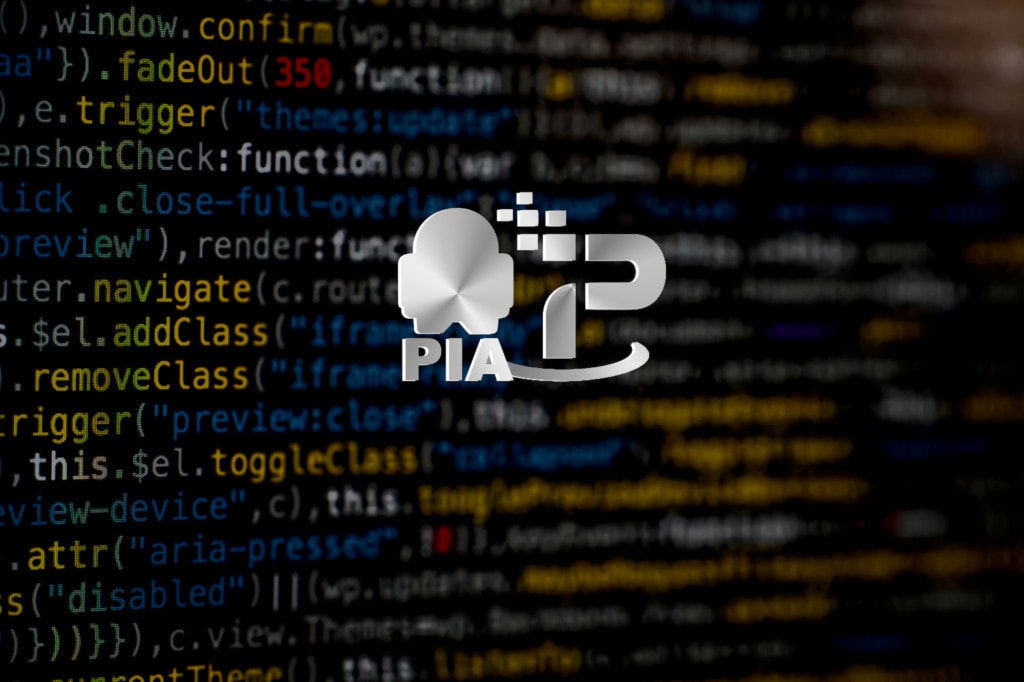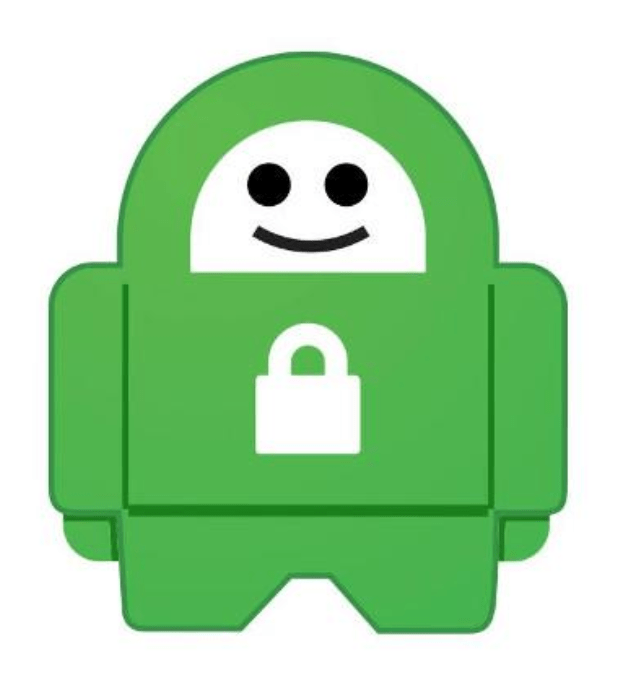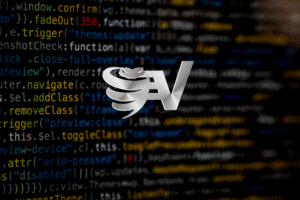Online privacy is a hot topic these days. Countless data breaches and the surveillance business model of companies like Google and Facebook have put the issue front and center.
VPNs are a popular and effective way of taking back some of your digital privacy. But which VPN provider should you choose? That’s not always an easy question to answer.
In this post, we compare Private Internet Access to IPVanish to see which one of the two we can recommend.
PIA vs IPVanish - Side By Side
[vpn vpn_1="PIA" vpn_2="IPVanish"]
Can't choose between Private Internet Access or IPVanish?
Both Private Internet Access and IPVanish have been around for a while. They are both well-known in the commercial VPN space. So it stands to reason that on the basic fronts, their offerings are going to be similar.
Things like native client applications, a VPN Kill Switch, industry-standard encryption, and a strong no-logging policy are covered by both providers.
We’ll look at how these two VPN providers distinguish themselves from one another based on features throughout this post. But one area in which they contrast is credibility.
Both these providers were approached by law enforcement and compelled to share user information.
In response, IPVanish silently and actively spied on one of its users at the behest of law enforcement.
Private Internet Access, on the other hand, informed law enforcement that that had nothing to share due to their no-logging policy and indeed shared nothing with law enforcement.
That’s a pretty solid difference, in my book…
1. Speed
Let’s start by comparing PIA and IPVanish on speed.
Speed is a major consideration for VPN providers and users alike. While any VPN will cause a certain slowdown of your connection, it shouldn’t be dramatic.
Digital privacy doesn’t need to come at the cost of a slow connection. Not if you’re using a decent VPN service, at least.
Private Internet Access
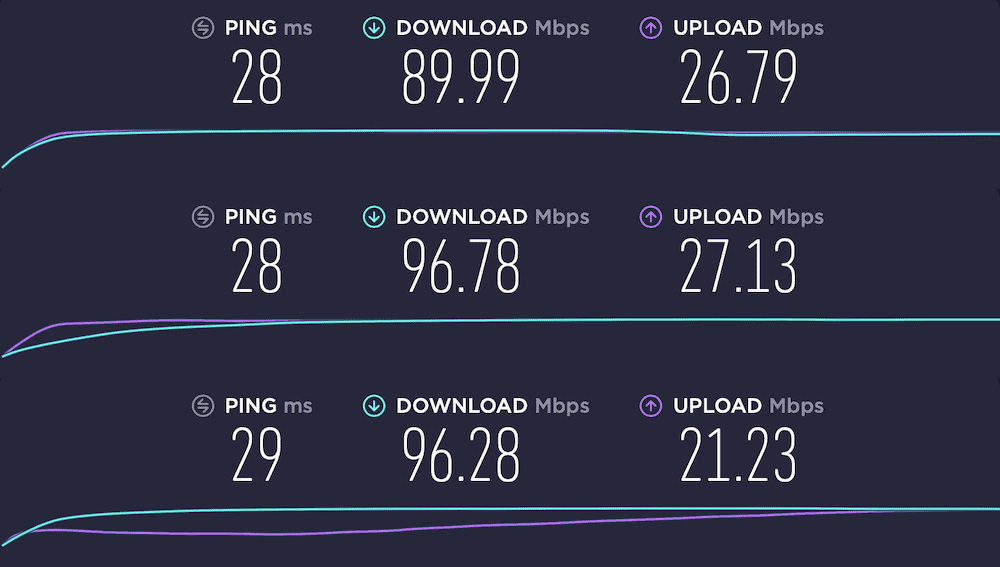
Tested on a 100Mbps (Download) and 30Mbps (Upload) network
Server: U.S.A., New York
Average Download Speed: 94.35Mbps
Average Upload Speed: 25.05Mbps
IPVanish
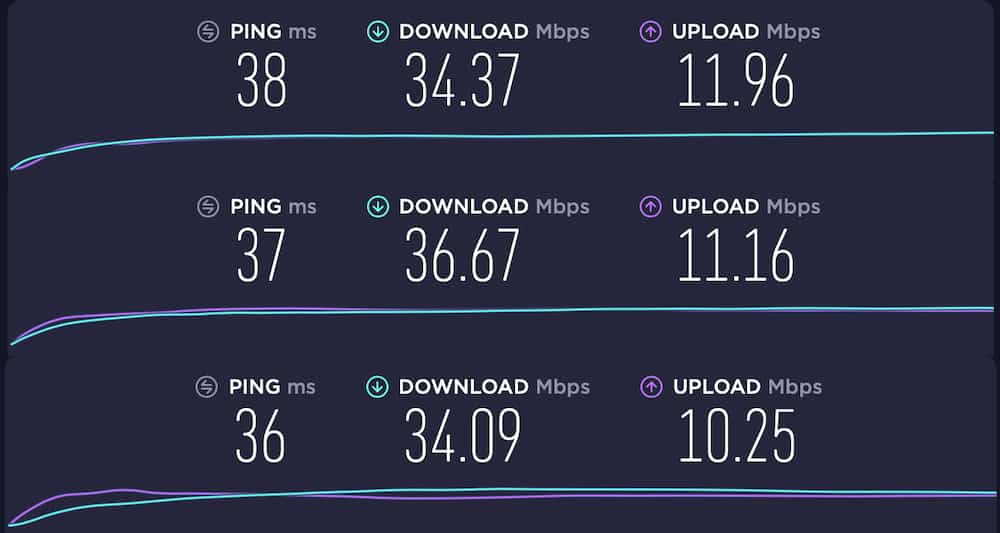
Tested on a 45Mbps (Download) and 15Mbps (Upload) network
Server: U.S.A., New York
Average Download Speed: 35.04Mbps
Average Upload Speed: 11.12Mbps
So we’re looking at the difference between the ISP speeds and the VPN speeds. And while neither of these results is really bad, PIA does perform better.
In fact, browsing the Web or downloading torrents at the speeds PIA is displaying here would be seamless. You wouldn’t even notice the slight reduction in bandwidth.
Winner: Private Internet Access
PIA just has better numbers. Not much more to say.
2. User-Friendliness
Today, a serious VPN provider has to appeal to techies and non-techies alike. VPNs have gone mainstream.
Part of what that means is that VPN providers must provide a native client app to connect to their network. Native clients greatly simplify client configurations and also protect less experienced users from misconfigurations.
Both PIA and IPVanish provide official client apps to their users. Private Internet Access also provides Chrome, Firefox, and Opera browser extensions.
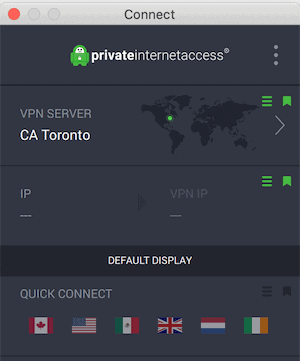
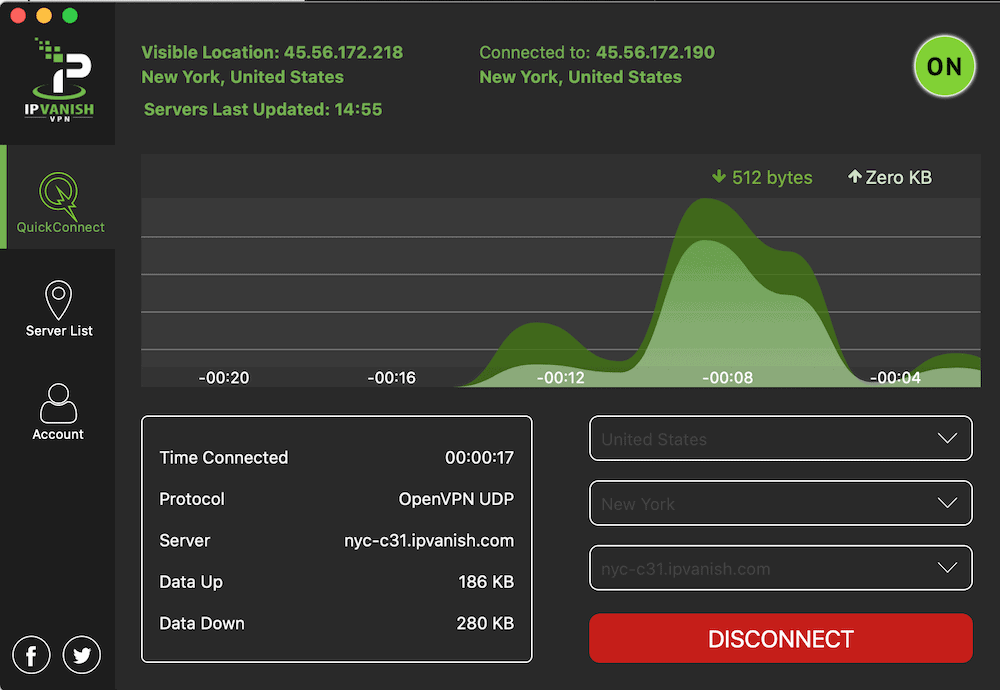
They both provide unlimited bandwidth.
The both provide DNS leak protection.
They both allow up to 10 simultaneous connections.
Winner: Private Internet Access
A lot of similarities here around bandwidth, simultaneous connections, and DNS leak protection. And while I’m not a fan of the layout of either of these apps, I think PIA’s is nonetheless better.
Add to that the three browser extensions that Private Internet Access provides and that puts them on top in my book.
Private Internet Access takes the point.
3. Streaming
As streaming services continue their ascension over traditional cableTV, bypassing geo-restrictions and VPN bans (ahem, Netflix…) has become increasingly important for many VPN providers.
Now, both PIA and IPVanish claim to be streaming-friendly. But neither of them is able to unblock Netflix.
With IPVanish, I couldn’t even log in to my Netflix account. While with PIA, I could log in, but couldn’t play anything, so not much gained there.
For more information on streaming with these providers, check out our Does Private Internet Access Work With Netflix? and Does IPVanish Work With Netflix? articles.
And if unblocking Netflix is important to you check out our posts on two providers that do unblock Netflix: Does NordVPN Work With Netflix? & Does Surfshark Work With Netflix?
Winner: Tie
Aside from the fact that with PIA you can log in to Netflix and not watch anything, both providers are equal on the streaming front.
4. Security and Encryption
Encryption is a VPN provider’s raison d’être. It’s at the core of their service. As such, the ciphers and the VPN protocols used are of capital importance.
The industry-standard cipher is AES-256.
Both PIA and IPVanish support AES-256.
IPVanish gives you no other option. While Private Internet Access allows you to choose between different ciphers (AES-256-CBC and AES-256-GCM). And PIA also allows you to choose your encryption level (128 or 256 bit).
While we prefer commercial VPN providers supporting only strong ciphers, PIA’s options are still secure – yes, even at 128 bits. And more experienced users can make the call based on their activities.
I’d recommend new users stick with 256-bit encryption.
As far as VPN protocols go, both providers support the following:
- IKEv2/IPSec
- OpenVPN
- L2TP/IPSec
- PPTP
PIA also supports WireGuard.
Now, IKEv2, OpenVPN, and WireGuard are considered secure. WireGuard is a relatively new protocol that was recently included in the Linux kernel, so we feel that it’s ready for wide deployment now. Kudos to PIA for supporting WireGuard.
However, L2TP/IPSec and PPTP are considered weak and obsolete. We’d rather VPN providers only support robust protocols.
To both provider’s credit, there are hoops to jump through in order to configure these protocols. This is a way of minimizing the risk of some less experienced users unwittingly shooting themselves in the foot.
So who wins here?
Winner: Private Internet Access
We’re giving this one to Private Internet Access. We like seeing VPN providers rollout WireGuard support. And the customization of ciphers and encryption levels their apps allow is implemented in a security-friendly way.
5. Logs and Privacy
It’s a given today that a commercial VPN provider will claim to commit to a robust no-logging policy. And both Private Internet Access and IPVanish make that claim.
Let’s look at how they make that claim and try and see if we can trust them on that or not.
Here’s an excerpt of Private Internet Access’ privacy policy:
"USES OF PERSONAL INFORMATION COLLECTED BY US: E-mail address is used to send subscription information, payment confirmations, customer correspondence, and Private Internet Access promotional offers only, Payment data is used to manage client signups, payments, and cancellations, Google analytics data is used to improve our website and delivery of our content, Compliance with valid legal process, Contact submissions and e-mails will be used for correspondence, and Temporary cookies are used to handle control panel logins. The data controller does not collect or log any traffic or use of its Virtual Private Network ("VPN") or Proxy.”
And here’s an excerpt from IPVanish’s privacy policy:
“We care deeply about your privacy rights, and we do not log any traffic or usage of our VPN. We do not sell or rent personal information to others, under any circumstance. Your data is secured and rendered anonymous whenever you are connected to our Services. In order to provide you with our Services, we need to collect an email address and payment method to process transactions.”
To be honest, I’m not really impressed with the way either provider communicates this in their privacy policy. Both policies read very much like the boilerplate privacy policies you find on almost every website.
Now, in terms of trust, these providers are very different.
As I explained in the opening paragraphs of this post, both Private Internet Access and IPVanish were approached by law enforcement and legally compelled to share information on one of their users, who was a suspect in an ongoing investigation at the time.
In response, IPVanish secretly spied on the user in question and handed everything over to law enforcement.
Private Internet Access, on the other hand, informed law enforcement that they had nothing to share because they do not log user activity. And they shared nothing. Awesome.
Different providers, different reactions. Clearly.
Winner: Private Internet Access
I don’t think a VPN provider can recover from such a breach of trust. And in my book, they shouldn’t. Private Internet Access takes this one too.
6. Pricing
Let’s turn to pricing now.
Below, I’ve listed the different packages, prices, and accepted payment methods for Private Internet Access and IPVanish:
Private Internet Access
Get Private Internet Access (save 73%)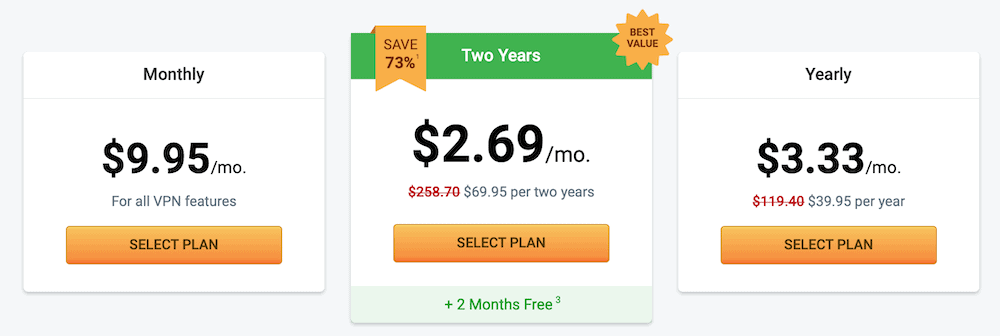
Subscriptions
- 9.95 USD for one month of service
- 35.95 USD for six months of service (works out to 5.99 USD per month)
- 39.95 USD for one year of service (works out to 2.85 USD per month)
Payment Methods
- Credit Card
- PayPal
- Amazon Pay
- CryptoCurrencies
- Zcash
- BEAM
- Bitpay
- mint
- Interac
IPVanish
Get IPVanish (46% off)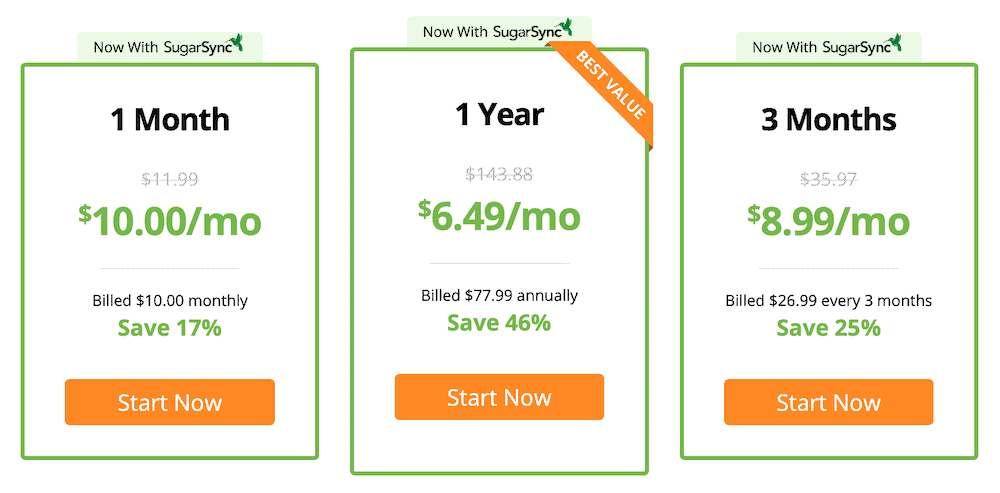
Subscriptions
- 10.00 USD for one month of service
- 26.99 USD for three months of service (works out to 8.99 USD per month)
- 77.99 USD for one year of service (works out to 6.49 USD per month)
Payment Methods
- Credit Card
- PayPal
PIA provide access to more than 3303 servers in 48 countries.
IPVanish provide access to over 1400 servers in 75 countries
And both providers offer a 30-day money-back guarantee.
Winner: Private Internet Access
So IPVanish is more expensive all around - though by only 5 cents for the monthly plan… But as far as accepted payment methods go, PIA blows IPVanish out of the water.
PIA also has more servers than IPVanish, though IPVanish has servers in more countries than PIA.
And we’re disappointed, though perhaps not really surprised, that IPVanish does not allow for anonymous payments of any kind, be it cash or cryptocurrency.
PIA gets the point here as well.
7. Torrenting
Both Private Internet Access and IPVanish are rather quiet about torrenting on their respective websites. But they’re both apparently P2P-friendly.
I tested torrenting over each provider’s VPN network and had no problems on either network. Downloads were fast, no disconnects. A smooth experience.
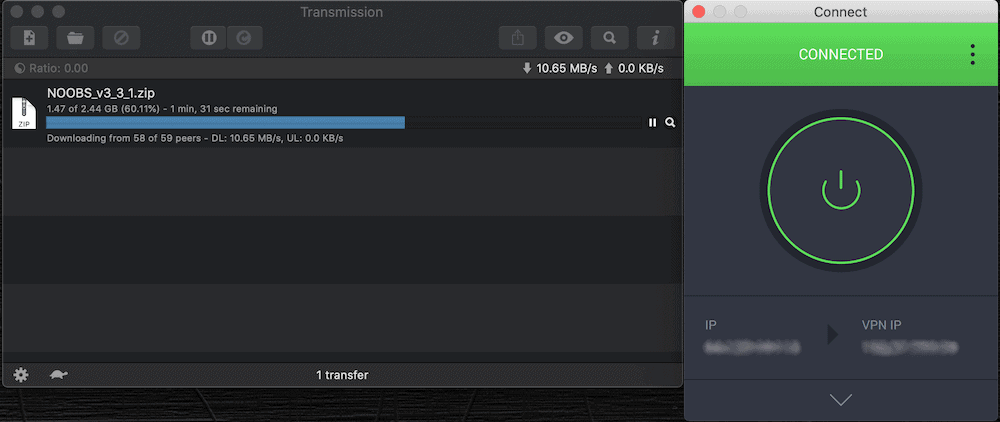
Digging a little bit more, I found that IPVanish provides a support document explaining how to use their SOCKS5 proxy for torrenting.
As you probably already know, a proxy server acts much like a VPN, but it doesn’t encrypt your traffic. It simply bounces it from your device over the proxy server, changing your IP address in the process.
You may get faster speeds than with a VPN, but you’ve lowered your security.
I’m going to quote myself here:
“Why a VPN provider, who provides encryption for a living, would suggest their users torrent over an unencrypted proxy rather than a VPN is beyond me. Do not torrent without a VPN.”
Winner: Private Internet Access
I’m giving the point to PIA for not promoting lower security options to their customers.
8. Other Features
There are also other areas in which these two providers differ:
- PIA provides an ads & trackers blocker
- PIA supports different ciphers/encryption levels
- PIA has proven they commit to their no-logging policy
- IPVanish provides a SOCKS5 proxy
- IPVanish bundle a free SugarSync subscription with their service
- IPVanish shouldn’t be trusted (I had to mention it again – it’s a big deal)
Standout Features
Private Internet Access
- MACE: Private Internet Access, offer a feature called MACE. MACE is an ads & tracker blocker. Once enabled, MACE checks your DNS requests against a blacklist. If your DNS request is to a blacklisted domain, MACE blocks that connection. The end result is an ad-free Internet. Ads & tracker blockers, such as MACE also protect you from certain types of malware. Nice.
- Proven Privacy Record: We’ve covered this in this post. But it really is one of PIA’s standout features. Private Internet Access stood up for its users in the face of law enforcement. And proved to the world that their no-logging claims were trustworthy. Awesome.
IPVanish
- Free SugarSync Subscription: IPVanish includes a free SugarSync subscription with all of their VPN plans. SugarSync is a secure online backup service. You get up to 250 GBs of remote backup space with the bundled subscription. This would normally cost 10 USD per month.
- SOCKS5 Proxy Support: IPVanish includes a SOCKS5 proxy server with their subscriptions. They promote it to their users for torrenting. Now, a proxy server does change your IP address and location but it does not encrypt your traffic. Using a SOCKS5 proxy rather than a VPN may well make your connection faster, but without encryption, it is far less secure than using a VPN. Again, do not torrent without a VPN.
Winner: Private Internet Access
PIA clearly take it here as well. The features they offer are more likely to appeal to privacy-minded folks than what IPVanish has to offer. Quite frankly, compared to PIA, IPVanish’s features feel rather gimmicky.
And just on reputation alone, I would go with Private Internet Access over IPVanish any day.
Conclusion: PIA vs IPVanish
And the winner is…?
We had eight categories:
One point is awarded to the winner in each category. When tied, both providers get a point.
So it looks like this:
- Speed – (PIA)
- User-friendliness – (PIA)
- Streaming – (Tie)
- Security & Encryption – (PIA)
- Logs and Privacy – (PIA)
- Pricing – (PIA)
- Torrenting – (PIA)
- Features – (PIA)
This one won’t be hard to count… So Private Internet Access gets 8 points and IPVanish gets one. Is it a blowout? Yes, it is. And it deserves to be.
We simply cannot recommend a VPN provider that has spied on its users. That would be like recommending you keep your personal diary in Google Docs…
Private Internet Access is the recommended choice.
Private Internet Access
Go With Private Internet Access if:
- You want to a high-security VPN provider you can trust
- You want an easy way to block ads & trackers
- You don’t need to use a VPN with Netflix
IPVanish
Go With IPVanish if:
- You don’t really care about privacy & security
- You want a free SugarSync subscription
- You want to download torrents insecurely, using a SOCKS5 proxy, for some reason…
For more information on these two VPN providers, you can take a look at our Private Internet Access review, our NordVPN Vs. Private Internet Access article and our IPVanish review.
VPN > VPN Comparisons > VPN Services
Private Internet Access Vs. IPVanish: Head to Head
By Marc Dahan
Last updated: June 15, 2020
